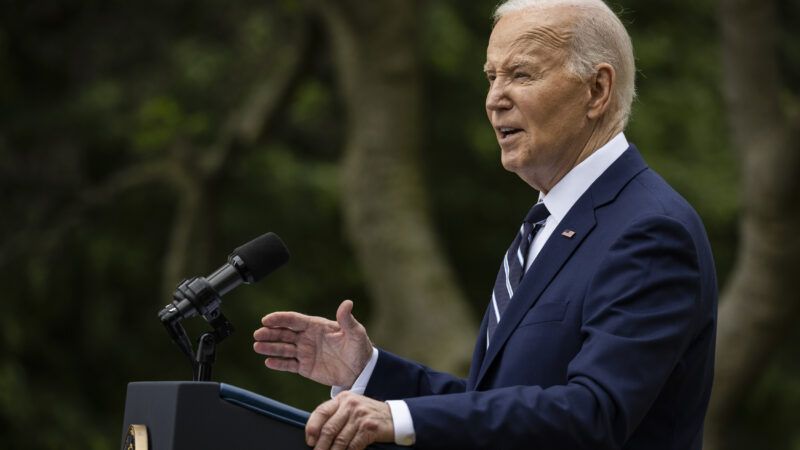Leave U.S. Steel Alone
Joe Biden, Donald Trump, Kamala Harris, and J.D. Vance agree that U.S. Steel needs to be controlled from Washington. They are all wrong.

On Monday, Vice President Kamala Harris became the latest prominent political figure to agree that the federal government ought to block the sale of U.S. Steel to a Japanese competitor.
On Wednesday, reports surfaced that President Joe Biden is ready to do exactly that. Biden "is preparing to announce that he will formally block Nippon Steel's proposed $14.9 billion acquisition of U.S. Steel," The Washington Post reported, citing a number of anonymous sources.
If Biden moves to block Nippon's purchase, he'll likely be applauded by former president Donald Trump and Trump's running mate, Sen. J.D. Vance (R–Ohio), both of whom have called for the Biden administration to prevent the deal from going through. Vance has been particularly vocal about this issue since U.S. Steel announced that it would be acquired by Nippon Steel last year. (In a bit of circular authoritarian logic, he's even asked the Securities and Exchange Commission (SEC) to investigate whether the deal could be blocked because U.S. Steel's shareholders may not have been adequately scared of the federal government's ability to block the deal.)
In short, the four most prominent politicians in the country (sorry, Tim Walz) agree: U.S. Steel, a private company, should not be allowed to conduct a transaction with another private company unless the federal government agrees.
This is absurd—particularly because the deal is obviously in the best interest of U.S. Steel.
"We'll admit that the competition for the dumbest economic policy is fierce these days—with prices controls on food, a 10% across-the-board tariff, and national rent control on the table," opined The Wall Street Journal's editorial board this week. "But opposition to the Nippon deal deserves careful consideration for this distinct dishonor given the deal's manifest benefits and nonexistent harm."
Indeed, Nippon's plan to buy U.S. Steel gives the legacy steelmaker something that Trump's tariffs and Biden's blather about blue-collar jobs never could: A chance to actually become more competitive in the global marketplace. Among other things, Nippon has promised to invest $2.7 billion in revamping U.S. Steel's plants.
"Nippon Steel's investment would help revitalize U.S. steel manufacturing," the Journal notes. "But these days America appears to be led by a confederacy of economic dunces."
It's correct to assume incompetence rather than malice when government officials demonstrate economic illiteracy, but evidence suggests that's not the case here. Cleveland-Cliffs, an Ohio-based steelmaker (hence Vance's interest), lost out to Nippon in the bidding war to purchase U.S. Steel. Since then, it has been leading the effort to get the government to block the deal over completely imaginary national security concerns.
Unsurprisingly, Cleveland-Cliffs reportedly anticipates being able to buy U.S. Steel on the cheap if the deal with Nippon is blocked. The company's CEO, Lourenco Goncalves, argues that the Nippon deal should be blocked simply because "Japan is not a friend" of the United States.
What? This is naked cronyism wrapped in nonsensical xenophobia: Japan is one of America's closest allies, and the Biden administration has worked to tighten that bond.
The political opposition to the U.S. Steel/Nippon deal is a perfect example of why concentrating more economic power in Washington, D.C., is a terrible idea. Politicians seeking to create more opportunities for American workers should be celebrating this major foreign investment in domestic manufacturing. Instead, the levers of power are being manipulated by lobbyists and special interests to do the opposite—in pursuit of policies that will leave U.S. Steel and its employees worse off.
The executives and shareholders of U.S. Steel are the ones who have the best interests of U.S. Steel in mind. But if the Post's reporting is correct, the Biden administration is about to overrule their judgment in the interest of political pandering and crony capitalism. That's gross.


Show Comments (22)